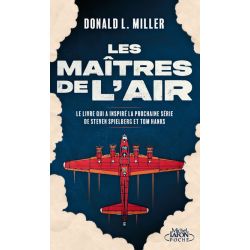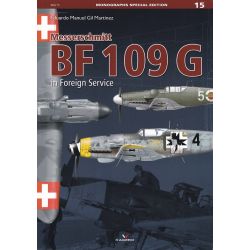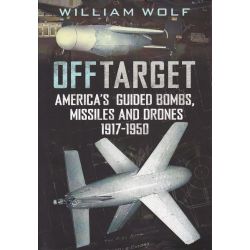Fermeture estivale du 1er août inclus au 22 août 2023
- Accueil
- › Aviation militaire - Seconde Guerre mondiale
- › Nouveautés Seconde Guerre mondiale
- › AVRO MILITARY 1910-63
Descriptif
Founded in 1910 by Alliott Verdon Roe, A.V. Roe and Company Limited built its first military aircraft two years later. By 1914, the company was literally flying when it designed the first of many iconic aircraft in the shape of the Avro 504, which sold in colossal numbers and was the key factor in keeping the company in the aviation industry after the end of the First World War, while many others fell by the wayside. In 1936, Avro became part of the new Hawker Siddeley group and within two years was operating a new factory at Chadderton, where, together with Newton Heath, all focus was on building the Anson, Blenheim and later the Manchester. Following production of just 200 Manchesters, attention turned to one of the greatest bombers of the Second World War, the Lancaster, of which over 7,300 were built. This caused further expansion at Avro’s main Woodford base, part use of Ringway and a ‘shadow’ factory at Yeadon under Avro control throughout the war years. Although an obvious contraction of orders took place during the post-war years, Avro was, thanks to its earlier successes, a big player in the British aviation industry and would continue to produce an iconic range of military aircraft. The last hurrah was the delightful 748 which just scrapes into this publication as the final example of an aircraft solely designed by Avro, while some still remain in service today. Of the company’s big three, examples of the 504, Lancaster and Vulcan also remain airworthy as testimony to what they achieved, the men who flew them and the great aircraft manufacturer that designed and built them. Many more are extent in museums across the world. This company profile is one of several that will have to be divided into two parts, one military and one civilian, although there will be some crossover, as many types served in both capacities. Avro deserves two entries in the series, and this book gives a good grounding to the huge and diverse range of aircraft that this once proud manufacturer produced.
Les avis sur le produit AVRO MILITARY 1910-63
Nos clients ont aussi aimé
|
AVRO MILITARY 1910-63
|
Ajouter au panier |
- Les Pionniers de l'aviation
- Aviation militaire - Première Guerre mondiale
- Entre Deux Guerres
-
Aviation militaire - Seconde Guerre mondiale
- Nouveautés Seconde Guerre mondiale
- Aviation Militaire Française
- Aviation Militaire britannique
- Aviation Militaire US
- Aviation Militaire russe - URSS
- Aviation Militaire - autres Forces Alliées
- Aviation Militaire Allemagne
- Aviation Militaire Italie
- Aviation Militaire Japon
- Aviation Militaire - Autres Force de l’Axe
- Opérations Front Ouest
- Opérations Front Méditerranée
- Opérations Front Est
- Opérations Front Pacifique
- Opérations Front Atlantique
- Aviation Militaire à Réaction
- Magazines Seconde Guerre mondiale
- Récits, Biographies Seconde Guerre mondiale
- Livres Divers Seconde Guerre mondiale
-
Aviation Militaire Contemporaine
- Nouveautés aviation militaire contemporaine
- Aviation militaire contemporaine française
- Aviation militaire contemporaine britannique
- Aviation militaire contemporaine US
- Aviation militaire contemporaine URSS, Russie, Pacte de Varsovie
- Aviation militaire contemporaine Europe et OTAN
- Aviation militaire contemporaine autres forces
- Guerre d'Indochine
- Guerre de Corée
- Guerre d'Algérie
- Guerre du Vietnam
- Guerre des Malouines - Falklands
- Guerres du Golfe - Irak - Afghanistan
- Autres Conflits Contemporains
- Hélicoptères Militaires
- Drones
- Magazines Aviation militaire contemporaine
- Collections Aviation militaire contemporaine
- Technologie - Prototypes - Expérimental
- Aviation militaire spécialisée - Transport - Espions - Surveillance
- Livres Divers Aviation militaire contemporaine
- Aéronavale
-
Aviation civile et Aviation Commerciale
- Nouveautés Aviation civile et aviation commerciale
- Aéropostale
- Aviation commerciale Avant Guerre
- L’Ere des Propliners - Les Hélices
- Jets Aviation commerciale
- Histoire des Compagnies Aériennes
- Registres Aviation commerciale
- Ouvrages Divers Aviation commerciale
- DVD Aviation commerciale
- Aéroports
- Magazines aviation civile et commerciale
- Catastrophes aériennes
- Formation personnel navigant
- Formation des pilotes aviation civile et aviation commerciale
- Livres divers Aviation commerciale
- Aviation française
- Hélicoptères - Autogires
- Aviation légère, aviation tourisme
-
Les Grandes Collections
- Nouveautés des Collections
- 4+ Publications
- Aerofax
- Les Ailes françaises
- Aircraft In Detail
- Air Doc
- Airdoc Smoke Trails
- AIRfile
- AJ Press
- Albatros
- Ali Straniere in Italia
- Airlife Combat Legend
- Ali d’Italia
- Altipresse : Histoires Authentiques
- Avions et Pilotes
- Batailles aériennes
- Camouflage & Markings
- Ciel de Guerre
- Coccarde Tricolori
- Daco
- Docavia
- Im Focus
- Ginter Air Force Legend
- Ginter Naval Fighters
- HT Model
- IBN
- Icare
- Kagero Legend of Aviation
- Kagero Lotniczne
- Kagero Monographie
- Kagero SMI Library
- Kagero Topcolors
- Kagero Top Drawings
- Kagero Units
- Kagero Topshots
- Luftwaffe at War
- Matériels de l'Armée de l'Air
- MBI Publishing
- Mini Docavia
- Mushroom
- Nordic Air Power
- Osprey Aircraft of the Aces
- Osprey Air Vanguard
- Osprey Airwar
- Osprey Combat Aircraft
- Osprey Duel
- Osprey Elite
- Osprey Modelling
- POL
- Rae
- Red Star
- SAM Air Data
- SAM Modeller Datafile
- Squadron Signal in action
- Squadron Signal In Detail and Scale
- Squadron Signal spéciaux
- Squadron Signal Walk Around
- Suomen Ilmavoimien Historia (Filnande)
- Warbird Tech
- Warpaint
- Warplane
- WAW
- Wings of the Black Cross
- Wingmasters Hors série
- WYD
- Bandes Dessinées - Ouvrages de Peintures - Photos aviation
-
Maquettes à monter et Die-Cast
- Nouveautés maquettes à monter et Die Cast
- Trumpeter/Revell/Roden/RS Models à monter 1/72ème
- Accessoires Aéroport
- Dragon Milit. 1/72
- Dragon militaires 1/400
- Herpa 1/500
- Herpa 1/400
- AZUR/FRROM maquettes à monter 1/72ème
- A&A Models/ACADEMY/AIRFIX/AMODELARMA HOBBY/AZUR/DORA WINGS/FRROM/SPECIAL HOBBY maquettes à monter 1/72ème
- Hasegawa/Heller/Hobby Boss/IBG/ICM/ITALERI/Mister Craft/ZVEZDA-maquettes à monter 1/72ème
- Gemini Civil 1/400
- Dragon civil 1/400
- Divers Modèles à monter et Die Cast
- Multimédia
- Conquête spatiale, espace
- Calendriers, Histoire militaire, jeux, sets de peintures et produits divers
- LE KIOSQUE
Informations





